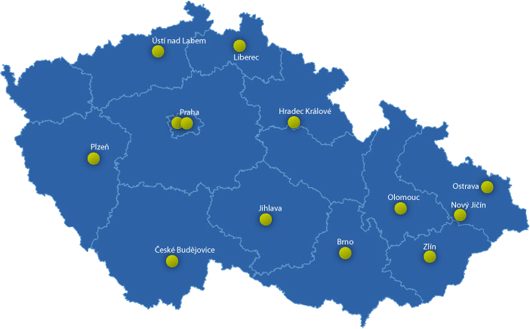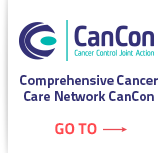Audit results of the Complex Cancer Centres and the evaluation of expensive treatment
More than 67,000 new cancer cases are diagnosed in the Czech Republic each year, and almost 28,000 deaths per year are cancer-related. The number of persons living with cancer – or having suffered from it in the past – exceeded 380,000 in 2005.
The most complex and the most expensive cancer care cannot be provided in just any hospital. In 2006, therefore, the Czech Society for Oncology (CSO) accredited a network of 18 centres into which the most complex and the most expensive care was subsequently transferred. The patients were therefore guaranteed a complex care with respect to cancer diagnosis and treatment. In mid-2008, the Ministry of Health carried out audits in these centres. Their aim was to assess the quality of provided care and compare quality levels between the various Complex Cancer Centres (CCC). At the time of audits, the individual centres demonstrated different levels of technical, professional and organizational quality. There were also differences in their capacity and human resources. In some of the CCCs, not all diagnoses were being covered, and consecutive palliative treatment was not available. In others, modern radiation technology was found to be missing. The audit resulted into the reduction in the number of CCCs from 18 to 13. The centres that did not manage to uphold their status will continue to function as previously, but will not be able to provide biological therapy as the health insurance companies have conditioned the reimbursement of this treatment by a CCC status. “Biological therapy is currently provided to eight to ten per cent of cancer patients,” says professor MUDr. Jiří Vorlíček, CSc., the President of the Czech Society for Oncology. Patients who need biological therapy will be treated in all of the 13 CCCs; on top of that, CCCs in Prague and Brno cooperate with contracted health care facilities there which will also provide biological therapy.

New network of Complex Cancer Centres.
The Czech Society for Oncology (CSO) approaches the expensive biological therapy with a great responsibility, keeping in mind the motto of the Czech National Cancer Control Programme: “The right treatment for the right patient in the right place at the right time.” The CSO cooperates with the Institute of Biostatistics and Analyses at the Masaryk University (IBA), the Masaryk Memorial Cancer Institute and Complex Cancer Centres, to keep long-term registries of financially demanding treatment, namely of the following drugs: trastuzumab, lapatinib, bevacizumab, cetuximab, erlotinib, pemetrexed, sunitinib, sorafenib, cetuximab a imatinib. Two basic approaches are applied when developing and running the registries: prediction (assessment of the number of patients to be treated in future) and retrospect (following the process and results of expensive treatment). The retrospective data assess such aspects of treatment as the correct indication of the monitored therapy, the process of therapy and its safety, the causes of premature termination and its frequency, immediate and long-term results of treatment. The team of authors from CSO and IBA worked out an analysis of all above-mentioned drug registries (as of December 15 2008), stating that the expensive treatment is distributed among cancer patients in a controlled manner, and only to those patients with complete diagnosis. Biological therapy is only given to patients whose overall condition allows them to benefit from the treatment offered. Data collected until now have shown that there have been improvements or at least stabilizations of malignant tumours in more than 80% of cancer patients upon treatment completion. Treatment was terminated for its toxicity in 5 per cent of the cases generally (in 10% of the cases in lung cancer patients). The Czech Society for Oncology has complete population data for the Czech Republic at its disposal, has been following trends in cancer epidemiology, and is capable to assess rather precise numbers of cancer patients to be treated in the following years. In 2008, these data processed by the CSO were presented to health insurance companies, thus having ensured the availability of modern cancer treatment to all patients who need it with regard to their condition and exactly specified diagnosis.
How to obtain a specialized treatment in a CCC? First, one must describe his or her problems to a general practitioner who will examine the patient and send him to a specialist. Depending on the type of problems, it can be a surgeon, internist, gastroenterologist, gynaecologist, urologist etc. If the symptoms are not assessed by the practitioner as severe, and if the patient is not duly examined despite persisting problems, he/she should seek a specialist by other means. Specialized examinations might reveal a malignant tumour. A successful treatment requires an effective cooperation among experienced pathologists, surgeons, radiotherapists, oncologists and other specialists, but also the patient himself and his family. It is important that the patient or his family communicate with the doctor in charge, look up essential information on the disease and make arrangements with the most easily accessed oncologist, whether he will treat the patient himself or whether he wants to transfer the patient to a Complex Cancer Centre. If the patient’s disease is suitable for biological therapy, he should be sent to a CCC in every case. After a consultation in the CCC, the patient is referred back to the care of the local oncologist, while the Centre merely controls the process of biological therapy; alternatively, the CCC takes over the treatment of this patient. Professor Jiri Vorlicek, President of the Czech Society for Oncology, said: “It is important that everyone takes an active approach to his or her health, looks up the relevant information, counsels the doctor in charge and verifies the acquired information in several sources.”
This is because only well-informed patients can actively participate in making decisions affecting their own treatment. And this is also the reason why the CSO has been trying for several years to raise the medical awareness of the Czech public. This is accomplished by the CSO website www.linkos.cz, which is a guaranteed source of information on oncology. It is designed not only for the professional public, but also involves a specialized section for cancer patients, their families and friends. The website is regularly updated and completed with new information. The project “Czech National Cancer Control Programme On-line” is aimed at the professional public. The project's website www.onconet.cz presents the network of Complex Cancer Centres, their equipment and projects in progress. Information on the epidemiology of malignant tumours in the Czech Republic is available to both professionals and lay public on the interactive portal www.svod.cz.
Contact:
Prof. MUDr. Jiří Vorlíček, CSc.
President of the Czech Society for Oncology at CMA JEP
E-mail:
Phone: 602 109 451
www.linkos.cz
13. 2. 2009 Czech Society for Oncology Press Release



